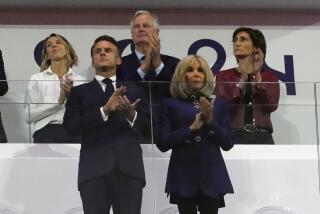Non-Communists Given 11 E. German Cabinet Posts
WEST BERLIN — Reformist Prime Minister Hans Modrow loosened the Communist Party’s grip on the East German government Thursday by choosing nearly half of his new Cabinet from four smaller political parties.
Reports from East Berlin said 11 of the 27 posts went to the four minor parties--the Christian Democrats, the Liberal Democrats, the National Democrats and the Farmers’ Party.
Until recently, these parties, with a total membership numbering only a fraction of the ruling Communist Party’s 2.3 million members, were viewed as satellites of the Communist Party. Each held only one seat in the hard-line larger Cabinet that resigned last week.
But they have been flexing their political muscles, and they provided the two leading contenders for president of the East German Parliament, the Volkskammer. Guenther Maleuda, of the Farmers’ Party, narrowly won that post over Manfred Gerlach, the leader of the Liberals.
The new Cabinet is to be approved at a special meeting of Parliament today at which Modrow is expected to outline a program of sweeping political and economic reforms.
These may include limited privatization of certain institutions, diplomatic sources in East Berlin said. The Parliament will then debate the new travel and election laws and the restructuring of the economy.
The greater government role for minor parties and plans for reform are the latest signs of dramatic change in East Germany in the month since Egon Krenz took over from hard-line Communist leader Erich Honecker amid an exodus of people to the West and mass demonstrations in the streets. The new leadership has opened the Berlin Wall and promised free elections.
In Bonn, West German Chancellor Helmut Kohl offered Thursday to supply East Germany with medical aid, personnel and equipment in those cities whose services have been weakened by the exodus of refugees to the West.
But the chancellor told the Bundestag, the Parliament, that any large-scale economic and financial help from West Germany would have to wait until the new Communist regime institutes reforms.
“We don’t want to force our opinions on anyone,” said Kohl, “but nobody can deny that socialism has shown itself to be a failure.
“I say again--economic aid will be in vain unless there is an irreversible reform of the economic system, an end to a bureaucratically planned economy and the introduction of a market economy.”
Among the changes that Kohl insisted the East German government make are free elections, independent political parties, an open press and unrestricted trade unions.
As for health assistance, the West German leader declared: “Every day doctors, dentists and other medical personnel tell us that they want to help the sick in East Germany. Naturally we wish to help where we can.”
Kohl also declared that the West German goal of reunification is mainly a matter for Germans but is still a long way off.
Kohl’s position, however, was attacked Thursday by West Berlin Mayor Walter Momper, a member of the opposition Social Democratic Party, who accused the ruling Christian Democrats of reacting passively to events in East Germany.
Momper, who watched more than 1 million East German visitors flood his city last weekend--with more to come this weekend--said Kohl should not attach so many conditions to financial support for East Germany.
He also criticized Kohl for bringing up the sensitive subject of German reunification in speeches.
Momper warned against an “artificial debate” on reunifying the country, saying:
“None of the opposition groups that have sprung up in East Germany has proposed reunification as one of its aims.”
In another development in East Berlin, the editor and top aides at the Communist Party newspaper, Neues Deutschland, were fired for not responding quickly enough to the new openness in the press.
SHIFT IN BULGARIA--Three holdover Politburo members were ousted. A15
More to Read
Sign up for Essential California
The most important California stories and recommendations in your inbox every morning.
You may occasionally receive promotional content from the Los Angeles Times.










